Career Outcomes
Your Success Story Is Waiting… Students who study neuroscience are poised to succeed in a wide variety of careers. From medicine, to education, to research, to law, the options available are limitless.
Neuroscience Career Pathways
Neuroscience majors can explore many jobs and professions, including in the field of medicine.
Some careers paths of neuroscience majors include:
- Scientist
- Physician
- Nurse
- Veterinarian
- Lawyer
- Scientific or medical writer
- Professor or health educator
- Pharmacy technician
- Public affairs or government
Explore neuroscience careers through this resource from the Society for Neuroscience.
Alumni Stories
Mabel Cummins, BA’23
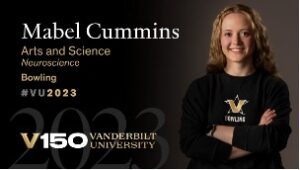 Mabel Cummins, 2022-23 NTCA/NCAA Player of the Year and captain of the Vanderbilt Bowling team, led her team to a national championship win. After receiving her undergraduate degree in neuroscience, Cummins is now pursuing her master’s degree in biomedical sciences and plans to apply to medical school. Read about her experience.
Mabel Cummins, 2022-23 NTCA/NCAA Player of the Year and captain of the Vanderbilt Bowling team, led her team to a national championship win. After receiving her undergraduate degree in neuroscience, Cummins is now pursuing her master’s degree in biomedical sciences and plans to apply to medical school. Read about her experience.
Laith Kayat, BA’23
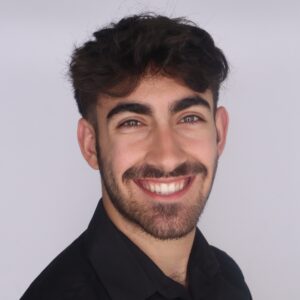 My name is Laith Kayat, and I graduated from the Neuroscience program in 2023. Since then, I have embarked on an exciting journey as a medical student at Northwestern University Feinberg School of Medicine, where I am pursuing a dual MD-PhD degree through their Medical Scientist Training Program (MSTP). This path allows me to combine my passion for patient care with my love for research, and I am thrilled to be working toward a career that bridges these two worlds.
My name is Laith Kayat, and I graduated from the Neuroscience program in 2023. Since then, I have embarked on an exciting journey as a medical student at Northwestern University Feinberg School of Medicine, where I am pursuing a dual MD-PhD degree through their Medical Scientist Training Program (MSTP). This path allows me to combine my passion for patient care with my love for research, and I am thrilled to be working toward a career that bridges these two worlds.
Reflecting on my journey, one of the pivotal moments that shaped my trajectory was attending the Vanderbilt Undergraduate Research Fair during my freshman year. There, I had the privilege of meeting Dr. Anel Jaramillo, a postdoctoral fellow in Dr. Danny Winder’s lab at the Vanderbilt Center for Addiction Research. Anel’s mentorship and the opportunity to join the Winder Lab marked the beginning of my deep dive into neuroscience research. Over the next four years, I immersed myself in the lab’s work, culminating in the completion of my Neuroscience Honors Thesis during my senior year. This experience solidified my commitment to a career in scientific discovery and patient care.
Beyond the lab, the neuroscience program at Vanderbilt played an instrumental role in my growth. From Dr. Herculano’s rigorous Neuroanatomy course to Dr. Wegener’s engaging Neurophysiology lectures, the faculty’s dedication to teaching and mentorship left a lasting impact on me. Their guidance not only equipped me with a strong academic foundation but also inspired me to pursue ambitious goals in medicine and research.
For current students, I would offer this advice: make the most of your time at Vanderbilt. Take the opportunity to truly master the material in your courses, but also go beyond the classroom. Build meaningful relationships with your professors and mentors—they are invaluable resources who can open doors and guide you toward your passions. Don’t shy away from exploring your interests, even if they seem unconventional or challenging. Success often requires a combination of hard work, perseverance, and a bit of luck, but it’s equally important to find joy in the process. Learn to embrace the grind, nurture your intellectual curiosity, and let your enthusiasm drive you forward. Vanderbilt is a place where incredible opportunities abound—seize them, and don’t be afraid to dream big.
For me, I wake up every day asking myself how I can improve the lives of others, particularly in their access to healthcare. That question has become my compass, guiding how I spend my time and the decisions I make. Whether it’s through research, clinical work, or advocacy, I strive to align my efforts with this purpose. I encourage you to find your own guiding question—one that excites and motivates you—and let it shape your journey. When you’re driven by a deeper sense of purpose, the challenges along the way become opportunities to grow and make a meaningful impact.
Jorge Antunez, BA’16
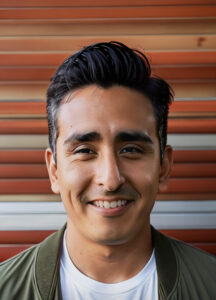 I’m currently a Strategy & Operations Analyst at Google Cloud, where I focus on go-to-market strategy and building scalable insights for Google Cloud Compute, AI/ML, and more. My path started with my neuroscience degree at Vanderbilt, which provided me with a strong foundation in analytical thinking, problem-solving, and data interpretation. These skills proved invaluable as I transitioned into the tech industry. After graduating, I honed my business acumen through similar analyst roles at Home Depot & Equifax. This led me to Google Cloud, where I’ve been able to apply my analytical abilities to complex business challenges.
I’m currently a Strategy & Operations Analyst at Google Cloud, where I focus on go-to-market strategy and building scalable insights for Google Cloud Compute, AI/ML, and more. My path started with my neuroscience degree at Vanderbilt, which provided me with a strong foundation in analytical thinking, problem-solving, and data interpretation. These skills proved invaluable as I transitioned into the tech industry. After graduating, I honed my business acumen through similar analyst roles at Home Depot & Equifax. This led me to Google Cloud, where I’ve been able to apply my analytical abilities to complex business challenges.
One key moment [that shaped my path] was realizing the transferable skills I gained from my Neuroscience background. While my initial focus was on research, I discovered a passion for applying data-driven insights to solve real-world business problems. Another pivotal decision was to actively seek out opportunities to learn about the tech industry and network with people working in it. This involved attending industry events, consistently up-skilling with the latest relevant technologies, and connecting with Vanderbilt alumni in the tech sector.
My advice would be to: 1) Don’t underestimate the value of your Neuroscience degree! The critical thinking and analytical skills you’ve developed are highly transferable to a variety of fields, including tech. 2) Be open to exploring different career paths. Your background can be a unique asset in unexpected areas. 3) Network! Connect with people in fields you’re interested in and learn from their experiences. Don’t be afraid to reach out to Vanderbilt alumni – they are often eager to help current students and recent graduates.
Elizabeth Lackey, BA’14
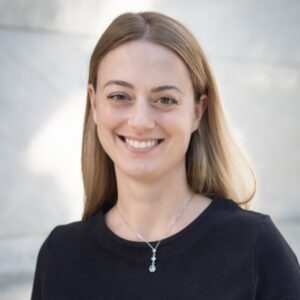 Elizabeth Lackey earned her undergraduate degree in Neuroscience and Economics at Vanderbilt and her PhD in Neuroscience at Baylor College of Medicine. She is a postdoctoral fellow at Harvard Medical School, where she is focused on determining the connectivity of recently-identified cerebellar interneuron subtypes and their specialized roles in cerebellar circuit function using a combination of slice electrophysiology, serial EM reconstructions, and in vivo approaches. Gaining undergraduate research experience at Vanderbilt was a key choice that shaped her path.
Elizabeth Lackey earned her undergraduate degree in Neuroscience and Economics at Vanderbilt and her PhD in Neuroscience at Baylor College of Medicine. She is a postdoctoral fellow at Harvard Medical School, where she is focused on determining the connectivity of recently-identified cerebellar interneuron subtypes and their specialized roles in cerebellar circuit function using a combination of slice electrophysiology, serial EM reconstructions, and in vivo approaches. Gaining undergraduate research experience at Vanderbilt was a key choice that shaped her path.
Ryan Glynn, BA’13
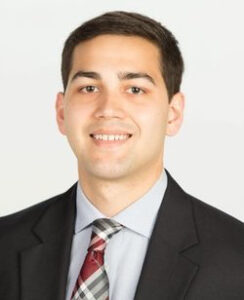 I am an alumnus from the class of 2013, and enjoyed being a neuroscience major at Vanderbilt. After graduation, I completed a master’s degree in Biomedical Sciences (2014) and medical school at Chicago Medical School (2018). I matched to neurosurgery residency at Tulane University, where I am currently in my last year of training as a PGY-7 chief resident treating conditions of the brain and spine, and specializing in minimally invasive and deformity spine surgery. I am completing a spine fellowship next year furthering this interest.
I am an alumnus from the class of 2013, and enjoyed being a neuroscience major at Vanderbilt. After graduation, I completed a master’s degree in Biomedical Sciences (2014) and medical school at Chicago Medical School (2018). I matched to neurosurgery residency at Tulane University, where I am currently in my last year of training as a PGY-7 chief resident treating conditions of the brain and spine, and specializing in minimally invasive and deformity spine surgery. I am completing a spine fellowship next year furthering this interest.
With a neuroscience major at Vanderbilt I was able to engage with research in MRB III (Randy Blakely’s lab) and could participate in projects from start to completion. Highlights of the academic curriculum for me were taking classes with Dr. Ford Ebner and learning how to review and critique scientific papers in detail. Neuroanatomy was an outstanding course and allowed me the opportunity to meet and shadow a neurosurgeon that furthered my motivation to join this field.
Annie Weisner, BA’09
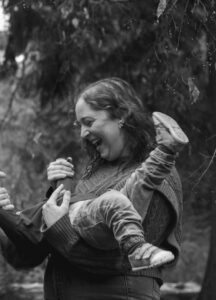 I completed my dual major in neuroscience and theatre at Vanderbilt in 2009. I went to graduate school and medical school at the University of Illinois Urbana-Champaign, completing my PhD in neuroscience in 2015 and my MD in 2018. I finished pediatric neurology residency at the University of Washington in 2023, and did an additional year of training in palliative care at the University of California San Diego before starting my current job. I’m a pediatric neurologist specializing in neuropalliative care for a robust community hospital, Mary Bridge Children’s Hospital in Tacoma, Washington. I care for kids with neurological disorders, especially kids with serious neurologic differences.
I completed my dual major in neuroscience and theatre at Vanderbilt in 2009. I went to graduate school and medical school at the University of Illinois Urbana-Champaign, completing my PhD in neuroscience in 2015 and my MD in 2018. I finished pediatric neurology residency at the University of Washington in 2023, and did an additional year of training in palliative care at the University of California San Diego before starting my current job. I’m a pediatric neurologist specializing in neuropalliative care for a robust community hospital, Mary Bridge Children’s Hospital in Tacoma, Washington. I care for kids with neurological disorders, especially kids with serious neurologic differences.
I chose Vanderbilt because of its neuroscience major, but until my senior year, I wasn’t sure if I’d pursue theatre or science. Vanderbilt gave me the unique opportunity to wholeheartedly embrace both these careers I loved, not pigeonholing me as a “premed” student, but encouraging me to explore all my interests. I worked in a lab at Vanderbilt while stage managing at Neely Auditorium. I worked on scientific publications and directed the Freshman Showcase my senior year. It was a wonderful, diverse, joyous college experience, and I felt both my majors opened doors for me rather than limiting me. Leslie Smith, my neuroscience undergraduate advisor, played a big role in convincing me to explore medicine rather than sticking to the career in research I had envisioned, and this proved to be an incredible fit. I still do some research, but have found a home in medicine that gives me great flexibility, reasonable work-life balance, and is incredibly rewarding.
To current or future students, my advice would be to not limit yourself. Pursue the things that bring you joy wholeheartedly and unapologetically, and don’t worry about whether they fit one clear career path. Embrace serendipity, take advantage of the opportunities that you stumble upon, and as much as you can, enjoy this time.
Krish Vigneswaran, BA’08
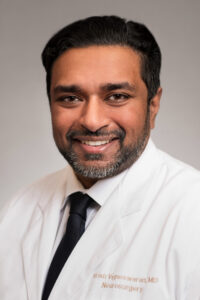 My journey from studying Neuroscience at Vanderbilt University to becoming a neurosurgeon specializing in neurosurgical oncology has been both challenging and deeply fulfilling. At Memorial Hermann–Texas Medical Center in Houston, I focus on treating patients with brain and spine tumors, a passion that was ignited during my undergraduate years. At Vanderbilt, courses like Neurobiology of Disease and Molecular Neuroscience fascinated me, laying the foundation for my understanding of complex neurological disorders. I was fortunate to learn from inspiring professors who encouraged critical thinking and nurtured my curiosity about the brain. One of the key moments that solidified my path was my research experience with Dr. Kendal Broadie where I worked on basic science research understanding the development of the neural synapse, which resulted in my first peer reviewed publication. That exposure, combined with clinical shadowing, confirmed my desire to pursue neurosurgery and focus on oncology.
My journey from studying Neuroscience at Vanderbilt University to becoming a neurosurgeon specializing in neurosurgical oncology has been both challenging and deeply fulfilling. At Memorial Hermann–Texas Medical Center in Houston, I focus on treating patients with brain and spine tumors, a passion that was ignited during my undergraduate years. At Vanderbilt, courses like Neurobiology of Disease and Molecular Neuroscience fascinated me, laying the foundation for my understanding of complex neurological disorders. I was fortunate to learn from inspiring professors who encouraged critical thinking and nurtured my curiosity about the brain. One of the key moments that solidified my path was my research experience with Dr. Kendal Broadie where I worked on basic science research understanding the development of the neural synapse, which resulted in my first peer reviewed publication. That exposure, combined with clinical shadowing, confirmed my desire to pursue neurosurgery and focus on oncology.
Medical school and residency were rigorous, but my time at Vanderbilt prepared me well for the intellectual and emotional demands of this field. If I could offer advice to current Neuroscience majors, it would be to seek out hands-on experiences—whether through research, shadowing, or clinical volunteering—because those moments will clarify your interests and fuel your passion. Neurosurgery, particularly in oncology, requires resilience, but the ability to offer hope and cutting-edge treatments to patients makes it immensely rewarding. Stay curious, build strong mentor relationships, and don’t be afraid to take on challenges that push your limits because those are the moments that shape your career in the most meaningful ways.
Rachel E. Harrison, BA’05
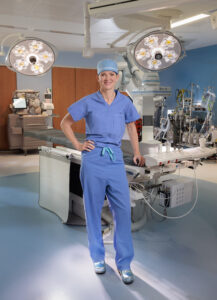 Neuroscience was an incredibly interesting major to have because the classes were so diverse… Students and professors constantly challenged my ways of thinking. This really set the foundation of how I act and think to this day. Attending Vanderbilt taught me how to study, how to publicly present, how to interact with others, and how to carry myself with confidence.
Neuroscience was an incredibly interesting major to have because the classes were so diverse… Students and professors constantly challenged my ways of thinking. This really set the foundation of how I act and think to this day. Attending Vanderbilt taught me how to study, how to publicly present, how to interact with others, and how to carry myself with confidence.
Jim Phillips, BA’05
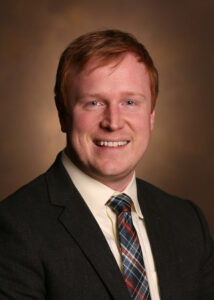
I am currently an Associate Professor of Otolaryngology–Head and Neck Surgery at the Vanderbilt Children’s Hospital. My career has had two primary focuses: cleft lip and palate repair and care for vascular anomalies in children and adults. I direct multidisciplinary clinics focused on both of these issues.
Post-college, my training began with medical school here at Vanderbilt. I would say that a key branch point during that time was to find critical mentors that helped guide and shape my goals for the next steps in training. Next, I pursued residency in Otolaryngology (ENT) at the University of Alabama at Birmingham. There, my focus was on soaking up as much clinical experience as possible, preparing me to be a surgeon. Next, I completed a fellowship in pediatric ENT in Little Rock, Arkansas. This training was focused on the care of cleft lip and palate.
My career advice would be to not take anything for granted. You are not owed anything, and no one is going to advocate for you as well as yourself. Try to imagine the perspective of the mentors you look up to and adopt that viewpoint. Be open to new and unexpected opportunities as you remain affable and available to walk through doors you didn’t expect to open for you.
Melissa Bauserman, BA’00, First Declared neuroscience major
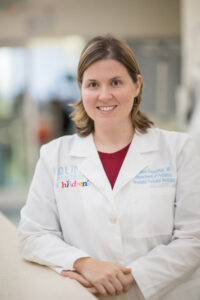
I am an academic neonatologist at the University of North Carolina. My clinical practice includes providing medical care for newborns in the UNC Neonatal Intensive Care Unit. I also do global health research, with a focus in the Democratic Republic of Congo. My work in the DRC has an origin story at Vanderbilt, where I was a French minor, which helps me conduct research in the DRC, a francophone country. I have continued my interest in neuroscience and am beginning a multi-national research study to evaluate neuroprotective agents for babies who experience hypoxic-ischemic encephalopathy (commonly referred to as birth asphyxia). Through that study, we hope to improve neurodevelopmental outcomes for babies in low and low-middle income countries.
I look back on my college years fondly and wish I could go back and do it again! I would tell students to take academic risks even if they don’t know how their classes or major will translate into a future career. Also, take time to develop yourself outside of class: meet interesting people, make good friends, and don’t take yourself too seriously.
Chad Patton, BA’99
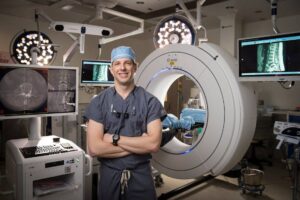 Chad Patton BA’99 completed his undergraduate studies in Neuroscience. While his journey to becoming a spine surgeon wasn’t always clear, his undergraduate experience in Neuroscience at Vanderbilt certainly set the foundation. Chad went on to complete a graduate degree in Anatomy and Neurobiology and subsequently a medical degree at the University of Louisville School of Medicine.
Chad Patton BA’99 completed his undergraduate studies in Neuroscience. While his journey to becoming a spine surgeon wasn’t always clear, his undergraduate experience in Neuroscience at Vanderbilt certainly set the foundation. Chad went on to complete a graduate degree in Anatomy and Neurobiology and subsequently a medical degree at the University of Louisville School of Medicine.
Building upon his Neuroscience background, he joined a research team focusing on the use of human adult olfactory stem cells for the treatment of spinal cord injury. Chad later developed his passion for Orthopedic Surgery during medical school and completed an Orthopedic Surgery residency program at the University of Vermont School of Medicine. It was there that his mentors helped him merge his background in Neuroscience with orthopedic surgery and his career path was now clear. Chad then completed specialized fellowship training in Spine Surgery at the University of Utah School of Medicine before moving with his family to Annapolis, Maryland.
Years later, Chad is now the Director of Spine Surgery for a large health system in Maryland. As a physician leader, he guides a clinical research team with a focus on functional outcomes after spine surgery; is actively involved in physician education; and has served in a variety of national roles for health care advocacy.
